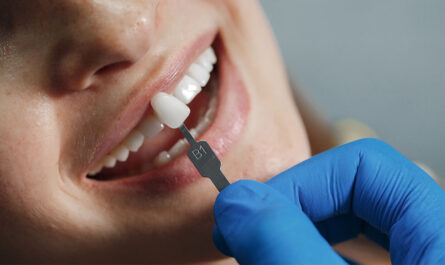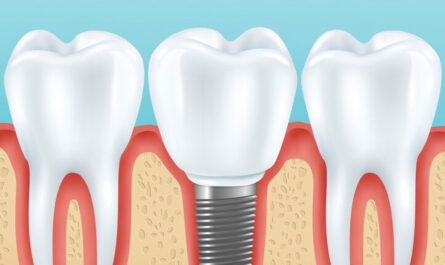Imagine biting into a crunchy apple, laughing loudly with friends, or smiling wide for a family picture. Now imagine doing all that without worrying about missing teeth. Sounds good, right? That’s exactly what dentures help you achieve.Dentures are not just about filling gaps; they are about bringing back confidence, comfort, and joy. Dentures have been changing lives for centuriesand with modern advancements, they’re more natural-looking and comfortable than ever before.In this blog, we’ll explore what dentures are, why they’re used, the different types, how to care for them, and even debunk some mythsall explained in a way that’s easy to understand but with enough depth to satisfy dental professionals too.
What is a Denture?
At its simplest, a denture is a removable dental appliance that replaces missing teeth. It can replace just a few teeth (partial denture) or an entire set (full denture).Think of dentures as “props” that support not only your smile but also the muscles in your face. Without them, cheeks may sag, lips may look thinner, and speech may get unclear. Dentures give structural support, just like scaffolding supports a building.
Why are Dentures Used?
Missing teeth don’t just affect looks they impact health, function, and emotional well-being. Here’s why dentures are important:
1. Chewing and Nutrition

Missing teeth can make it hard to chew, leading to poor digestion and avoidance of healthy foods (like raw fruits and vegetables). Dentures restore chewing efficiency.
Tech note: A well-designed denture balances occlusal forces, preventing trauma to oral mucosa and improving mastication efficiency.
2. Clear Speech

Teeth play a vital role in producing sounds like “s,” “f,” and “th.” Dentures help restore clarity of speech.
3. Facial Support and Aesthetics

Without teeth, the face may appear sunken or aged. Dentures restore lip and cheek support, bringing back a youthful look.
4. Confidence and Mental Health

Studies show tooth loss can lower self-esteem and increase social anxiety. Dentures give patients their smileand social lifeback.
Types of Dentures
Here’s where it gets interesting! Dentures aren’t one-size-fits-all. Depending on the number of missing teeth, oral conditions, and budget, there are several options.
1. Partial Denture
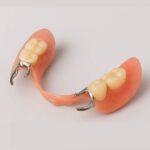
- General view: Designed for patients missing a few teeth, partial dentures clip onto natural teeth.
- Pros: Affordable, easy to fabricate, non-invasive.
- Cons: Bulkier than fixed options, may need replacement over time.
- Tech note: Retention often achieved with clasp assemblies and sometimes precision attachments.
2. Cast Partial Denture (CPD)
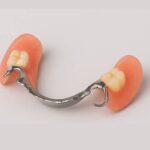
- General view: These are partial dentures with a metal framework for strength and stability.
- Pros: Long-lasting, more comfortable, distributes chewing forces evenly.
- Cons: Slightly more expensive, requires good oral hygiene.
- Tech note: Frameworks are often made of cobalt-chromium alloy with major and minor connectors, rests, and clasps designed per Kennedy classification.
3. Flexible Denture
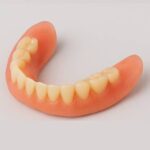
- General view: Made from soft, bendable resin, these dentures adapt easily and feel light.
- Pros: Aesthetically pleasing (no metal clasps), comfortable, great for patients allergic to metal.
- Cons: Not as strong as cast partials, harder to repair.
- Tech note: Usually fabricated from nylon-based thermoplastic resins (Valplast). They require special polishing to avoid porosity.
4. Full Denture (Complete Denture)
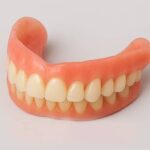
- General view: For patients who have lost all teeth in an arch (upper, lower, or both).
- Pros: Restores entire function and appearance.
- Cons: Takes time to adapt, requires regular adjustments.
- Tech note: Success depends on border molding, suction (in maxillary dentures), and neuromuscular adaptation. The lower denture is notoriously harder to stabilize due to tongue movement.
Caring for Your Dentures
Even superheroes need care! Dentures can last years if treated properly.
Daily Care Tips:
- Clean dentures twice daily with a soft brush and non-abrasive cleanser (not regular toothpasteit can scratch).
- Soak them in water or denture solution overnight to prevent drying.
- Rinse after every meal to remove food particles.
- Visit your dentist regularly for adjustments (your gums and bones change over time).
Technical reminder:
- Over time, alveolar bone resorption leads to ill-fitting dentures. Relining, rebasing, or remaking may be required every 5–7 years.
Conclusion
Dentures are more than just replacement teeth they’re confidence boosters, health protectors, and smile restorers. Whether it’s a flexible partial for a young professional or a full denture for a grandparent, today’s options are advanced, comfortable, and natural-looking.
For patients: Don’t be shy about discussing dentures with your dentist. They’re safe, affordable, and life-changing.For professionals: Dentures remain a cornerstone of prosthodontics, blending art and science. With new materials and digital dentistry, they are evolving into even more patient-friendly solutions. So, the next time you think about hiding your smile remember, dentures are here to bring it back, brighter than ever. After all, life’s too short not to laugh, eat, and smile freely!
FAQ
How long does it take to get used to dentures?
Most people adapt to dentures within a few weeks. Initially, they may feel bulky, affect speech, or cause mild soreness, but with regular wear and dentist-guided adjustments, comfort improves significantly.
Can I eat normally with dentures?
Yes! Start with soft foods and gradually introduce harder items as you adjust. Cutting food into small pieces helps. With practice, most people can enjoy almost all their favorite meals.
How often should dentures be replaced?
On average, dentures last 5–7 years. Over time, changes in the gums and jawbone can cause poor fit, so relining, rebasing, or replacing them may be necessary.
Can I sleep with my dentures on?
Dentists usually recommend removing dentures at night. This allows gums to rest, prevents fungal infections, and extends the denture’s lifespan. However, in some cases (like immediate dentures), your dentist may advise wearing them overnight.
Are dentures noticeable to others?
Modern dentures are designed to look very natural, blending seamlessly with your gums and smile. Flexible resins and advanced shading techniques make them nearly indistinguishable from natural teeth.

